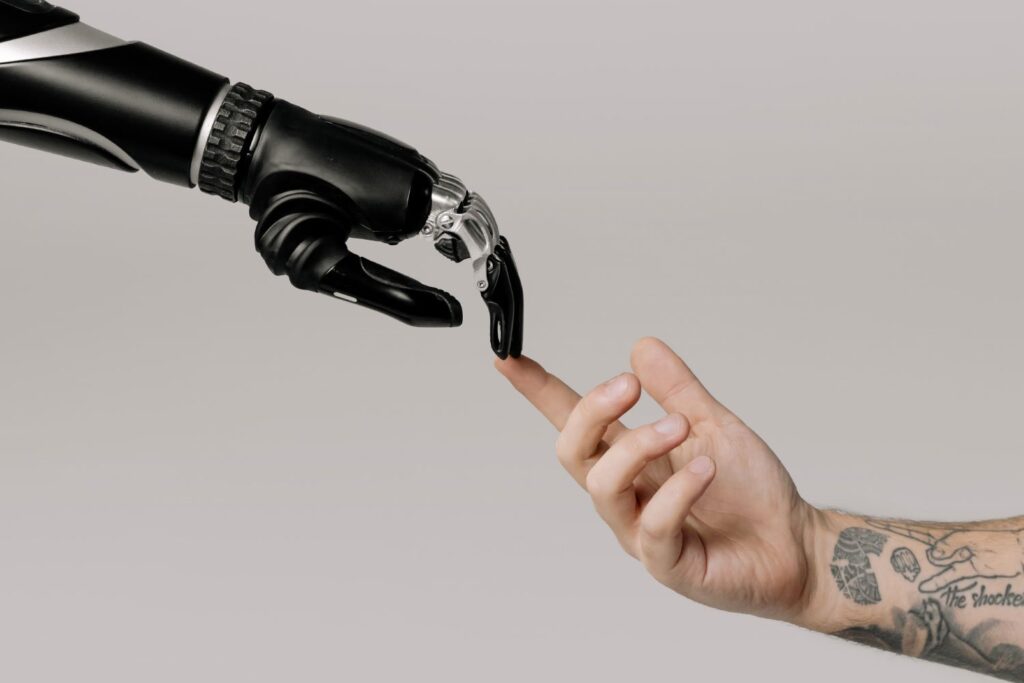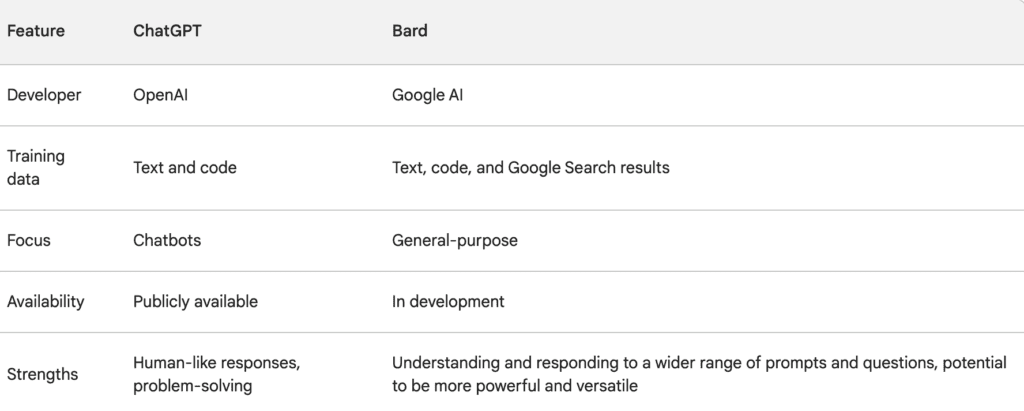In 2023, as the digital realm continues to evolve, SEO and AI have become inseparable allies. This union is introducing a fresh wave of digital marketing, reshaping how machines learn and users search. With tools like ChatGPT and Google’s generative AI leading the charge, the SEO landscape is poised for a significant transformation. This article delves into the latest AI-driven events that have impacted SEO. We’ll also uncover their opportunities and challenges, highlighting how SEO professionals can harness these innovations to their advantage and stay ahead in this ever-changing game.

The Rise of ChatGPT
Near the end of 2022, numerous digital professionals, including myself, became engrossed with ChatGPT. Interacting with this AI tool was a revelation, often feeling uncannily human-like. It was hinting at a new era for SEO and its associated services.
Hailing from OpenAI, ChatGPT, an evolution of the GPT-3 model, specialises in interactive dialogues. Its foundation is a colossal neural network trained on a vast amount of internet text data. This vastness enables the model to predict upcoming words in a statement based on prior context. ChatGPT can generate text and conversationally respond to user prompts by using a technique called deep learning.
Even though it’s the latest trend, AI in SEO is not something new. In reality, AI innovation in the SEO industry existed before Chat GPT. AI tools for content writing like SurferSEO were the bread and butter for many SEOs long before Chat GPT. Google also used artificial intelligence (AI) in various platform applications and services. However, ChatGPT’s arrival heralded a new chapter in SEO services, introducing capabilities like crafting SEO-optimised meta tags, structured data, keyword segmentation, and even coding complex functions with a simple GPT prompt. This evolution encouraged many professionals to ponder about the future of SEO and how AI will impact the rankings game.
Google’s Response: Bard
In response to ChatGPT’s burgeoning acclaim, Google introduced Bard in February 2023. This cutting-edge conversational AI service, powered by Google’s LaMDA, is adept at tasks ranging from language translations to creative content generation. It’s trained on an extensive dataset, including text, code, and Google Search outcomes. Both Bard and ChatGPT are working in a way that they only predict what words or sentences will come next based on the input they’ve been trained on. They determine what words/sentences are most likely to go next. While this looks good on the surface when they sometimes deliver outstanding results, that is not always the case. Due to the nature of this predictive generation, both AI services sometimes completely miss the mark.
ChatGPT and Bard differences
ChatGPT and Bard are large language models (LLMs) that can generate text, translate languages, write creative content, and informationally answer your questions. However, there are some critical differences between the two models:
ChatGPT is trained on a dataset of text and code, while Bard is trained on a text, code, and the Google Search results dataset. This means that Bard can access a broader range of knowledge from the web to draw from, making it more comprehensive in its answers.
Another difference between ChatGPT and Bard is that ChatGPT is explicitly designed for chatbot applications, while Bard is a more general-purpose language model.
Summary of the key differences between ChatGPT and Bard provided by Google Bard:

Google Search Generative Experience: A Game-Changer?
Another AI innovation that will change SEO is Google SGE (Search Generative Experience), announced at the Google I/O 2023 conference in California. SGE is an artificial intelligence model that generates search result snippets for specific search queries. It uses natural language processing and a deep learning algorithm to create relevant and informative snippets. SGE is still under development, but it can potentially revolutionise how we search online and even the SEO industry itself. Google recently confirmed that the SGE will include links to sites, which is positive news for the SEO world after the huge dissatisfaction with Google taking other websites’ data and displaying it as its own without any credit to the owners of such sites.
AI and the Future of SEO
AI technology and automation have undoubtedly transformed various industries and professionals around the globe. Many fear that AI, particularly generative AI, may replace SEO professionals. While AI has shown remarkable capabilities in automating tasks and analysing data, it is doubtful to kill SEO Services as a profession. At the end of the day, SEO requires a deep understanding of search engine algorithms, as well as rational thought, something which generative AI cannot do (at least at this point in time).
According to the Google Trends data, the interest in search terms like “SEO Professional” is today (September 2023) almost at the same level as in January 2021. Still, keep in mind that the interest in the search term “AI SEO” is constantly increasing:


Furthermore, it is essential to acknowledge that large language models (LLMs), while groundbreaking, do have many limitations. They rely on a probability distribution and consistently lack accuracy. It’s not like AI will kill SEO; it’s the opposite: Artificial intelligence can benefit specific Search Engine Optimization areas, such as analysing data and generating content. Nevertheless, the human factor and innovative thinking are vital in SEO, mainly when comprehending user intent and devising strategies for long-term success. Additionally, AI can only partially replicate the personal touch and expertise that SEO professionals offer in client consultations, understanding complex business objectives, and keeping up with industry trends. Therefore, although AI may enhance certain SEO functions, it is more likely to serve as an addition to the vast set of tools SEOs use that complements the work of SEO professionals rather than completely replacing them.
Leveraging AI in SEO Services
AI’s presence has shaped digital marketing strategies since the inception of early content tools. To maintain a competitive edge, SEO professionals must recognise AI’s burgeoning influence in SEO and effectively leverage it. AI can take over SEO’s monotone and time-consuming aspects, allowing professionals to do other things that need human attention and an expert eye.
This ongoing transformation is redefining the operational dynamics of SEO services, optimising processes in areas like:
On-page SEO: This encompasses high-quality content creation, content briefings, semantic keyword categorisation, and E-E-A-T content assessments.
Technical SEO: Here, AI can craft intricate regular expressions for redirects, orchestrate website audits, and produce XML or JSON-LD code based on user inputs.
Off-page SEO: Here, AI tools can help speed up, for example, outreach email and optimisation of anchor text
Conclusion
The evolving landscape of SEO is increasingly influenced by AI advancements. As this progression continues, the new SEO isn’t just about optimising content, building links and fixing tech errors; it’s about leveraging AI’s capabilities, especially in prompt customisation and AI tool testing. The intersection of AI and SEO suggests a future enriched by AI-driven strategies. SEO professionals must adapt, embracing these AI tools to remain competitive. Mastery of prompt customisation could be pivotal in future SEO scenarios. While AI will enhance the SEO industry, the human touch remains invaluable. True SEO success lies in understanding complex algorithms, the real user intent, and devising sustainable strategies, which are areas where human expertise is irreplaceable.




